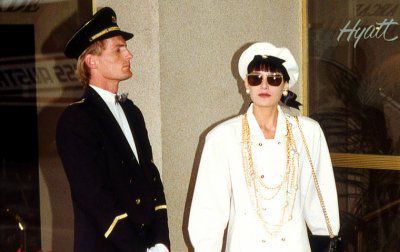一个纽约看门人的自述
爱思英语编者按:纽约,这个世界第一的繁华都市,是整个美国的金融经济中心、最大城市、港口和人口最多的城市。它的一举一动无时无刻不在影响着世界。这个城市里有着各种各样的人,过着各种各样的生活,体验着人生百态。有人过着光鲜亮丽的生活,有的人则得平凡质朴,但他们是不是都能在这里找到归属感呢?我们来看看大都市的看门人过着怎样的生活?
True Confessions Of A New York City Doorman
Pablo, 64, has been working as a doorman at a building on the Upper West Side since the winter of 1986.
His broad smile is well-known up and down the block where he works.
In the half hour we talked to Pablo he greeted at least 20 residents and five workmen coming and going (in English and Spanish); made at least ten calls upstairs to announce visitors; helped someone who had the wrong address; answered a call about a package delivery; fielded a call about an intercom that wasn't working; joked with the super; politely informed a person who wanted to distribute menus under doors that that wasn't happening and answered questions about what that burning smell was this morning: overdone toast.
Here are some of his thoughts about his job:

How did you get the job of doorman?
I was working in a belt factory on West 36th Street when I heard from a friend who was working in this building that the night doorman was about to quit. I knew the super, too, so I decided to go for the job.
I started out on the night shift and although for lots of doormen, the night shift is quiet, in this building it's very busy. We have lots of show business people here who leave at night and come back in the early morning.
When I started I was expected to clean the lobby, too. Doormen don't have to do that any more.
What are your hours?
I work the day shift now, 8 to 4 with Sundays and Mondays off. I get four weeks and 4 days vacation. It's a very good job.
Then would you recommend the job to one of your children or grandchildren?
I would prefer that they go to school and finish college. But if they don't, I would recommend it. It's a clean job. It's always lively, I'm never bored.
How has the Upper West Side changed since you started working there in the 80's?
Oh my. I don't like to think about that. It was scary. There was lots of drug dealing on the block, sometimes by the tree in front of the building.
I knew who the dealers were, they knew who I was but I never talked to them.
I'm reading a book now about the CIA and South American drug cartels and how they would sell drugs on the streets of New York. It reminded me of that time. The neighborhood is totally different now.
What are your duties?
I am expected to open the door, announce people, take packages and if asked I will help someone get a taxi. I don't expect a tip for that. Some tenants ask me to move their car for them but I always say no. That's not my job and it's too risky. We're not even allowed to move our own cars when we're on duty so I leave mine at home and take the subway.
What's the best part of your job?
The people. You get to know everyone in the building and they're all very good to me. I love children and now we have lots of them in the building.
Some of the children who grew up here in my early years here have their own children now and come back to see me. I love that.
And the worst part?
It's when people want your attention when you're trying to do something else. If I am taking a package from someone or on the phone and someone else is asking me a question at the same time, that upsets me.
I only have two hands and can only do one thing at a time. I wish everyone understood that. I also don't like the very cold days when the cold air comes in whenever I open the door.
How do you stay warm then? Extra layers of clothing?
No, I do it up here [pointing to his head]. Mind over body. And when it's cold, tenants bring me hot coffee.
Do people who are looking for an apartment ask you if there are any vacancies?
Yes. When they do that I just say “yes” or “no”. Sometimes brokers leave cards with me to give to people who ask but I prefer not to get involved.
What's the most common question that people who are looking to buy in the building ask you?
They want to know if the neighborhood is safe. I tell them: this is New York. This is a really nice neighborhood but that doesn't mean that bad things don't ever happen here.
Have there been any emergencies in the building while you were on duty?
There was one fire and that happened on my day off. The super called me at home to tell me about it and I came right over to help.
When your union called a strike in the '90s, how did the tenants react?
That was a tough time for me. On the same day that the strike was called, my wife went into the hospital for open-heart surgery.
When I stood in front of the building with other strikers, the tenants told me not to worry, that they were on our side. They brought us food and drink. It all worked out for the best.
This building still has renters in it. Do the renters treat you any differently than the co-op owners?
It's about 75 percent owners now but there's no difference. They're all lovely people—I have no complaints. (Big smile)